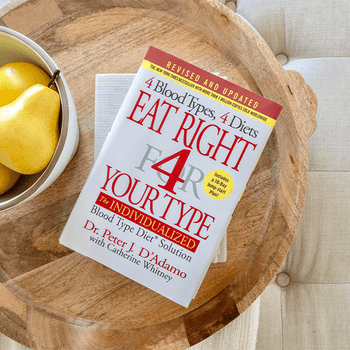Review/ New Woman Magazine |
|
The secret to losing weight, getting fit,
and having more energy? It may be as simple as knowing your blood type. Most of us don't give any thought to our blood type. If we think of it at all, it's as a relatively unimportant detail, something that only our doctors need to know if there's a dire emergency and we are suddenly in need of a transfusion. Unless we're blood donors, many of us probably don't even know our blood type. But from more than 15 years of my research as a naturopathic physician, I have become convinced that blood type plays a vital role in our daily health, our ability to stay fit, to ward off illness, and to lose (or gain) weight. More specifically, I have found that blood type is a factor in our energy levels, in the efficiency with which we burn calories, in our emotional response to stress, and perhaps, as many Japanese think, even in our personalities. Our blood type contributes to who we are, and I believe that knowing it can help us to achieve optimal health and longevity. My research in this field was inspired by the intriguing discoveries my father (also a naturopathic physician) had made during his studies at the great spas of Europe. He noticed that although many of the sicker patients did well on vegetarian and low-fat spa diets, other patients did not—their conditions even worsened. Observing this, he reasoned that there could be something that determines the differences in individual dietary needs, and since blood is a fundamental source of nourishment to the body, he began blood-typing his patients and observing the individual reactions to differently prescribed diets. Definite patterns emerged—for example, his type-O patients thrived on meat-protein-heavy diets and rigorous activity, while his type-A patients did better eating soy proteins and doing more gentle physical activities like yoga and Tai Chi Chuan. Why? I began searching for the scientific and anthropological basis for his theories—and I was amazed at what I learned. I discovered that through our blood types, our bodies are predisposed to certain strengths and weaknesses that were passed down from our ancestors. Other doctors have told me they also have seen positive results using blood-type diets with their patients, including increased energy and improvements in arthritis and allergies. The Basics of Blood-Type Nutrition Everyone has blood-type markers called antigens, which act like security checks on all the cells of your body. These antigens define your blood type. For example, if you have type-A blood, you have type-A antigens, and if you have type-B blood, you have type-B antigens. Some of these antigens are sugars that rest on the surface of your cells, much like the fuzz on a tennis ball. Most foods contain sticky proteins, called lectins, that stick to these antigens (like Velcro would stick to a tennis ball). In my lab research, I've found that different lectins stick to different antigens because, I believe, lectins are blood-type specific. In other words, some have affinities for A antigens and others have affinities for B antigens. Lectins from foods that don't agree with a certain blood type can irritate the cells of that person's digestive tract. When the digestive tract is irritated or swollen, it can cause fatigue, weight gain, irritable-bowel syndrome, or even stomach ulcers. So the key to eating according to your blood type is to avoid foods that contain the lectins that don't agree with you. Your first step, of course, is to find out your blood type, which is easier than you may think. If you've ever donated blood, you should have a card that shows your type, or simply call the American Red Cross National Headquarters at (703) 206-7090 to locate your records. If you've donated blood, check your birth certificate. If there's no record there, ask your physician to refer you to a lab to be typed. The test is a pin prick that usually takes less time and costs less than a cholesterol test (less than $25). Copyright © 1997 HIII Inc. |
Reviewed and revised on: 01/12/2023
EAT RIGHT FOR YOUR TYPE
This completely revised and updated 20th Anniversary edition of EAT RIGHT 4 YOUR TYPE makes this worldwide phenomenon even more accessible. Click to learn more |

The statements made on our websites have not been evaluated by the FDA (U.S. Food & Drug Administration).
Our products and services are not intended to diagnose, cure or prevent any disease. If a condition persists, please contact your physician.
Copyright © 2015-2023, Hoop-A-Joop, LLC, Inc. All Rights Reserved. Log In


